|
|
|
Sort Order |
|
|
|
Items / Page
|
|
|
|
|
|
|
| Srl | Item |
| 1 |
ID:
140173
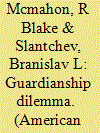

|
|
|
|
|
| Summary/Abstract |
Armed forces strong enough to protect the state also pose a threat to the state. We develop a model that distills this “Guardianship Dilemma” to its barest essentials, and show that the seemingly ironclad logic underlying our existing understanding of civil-military relations is flawed. Militaries contemplating disloyalty must worry about both successfully overthrowing the government and defeating the state’s opponent. This twin challenge induces loyalty as the state faces increasingly strong external threats, and can be managed effectively by rulers using a number of policy levers. Disloyalty can still occur when political and military elites hold divergent beliefs about the threat environment facing the state, since militaries will sometimes have less incentive to remain loyal than the ruler suspects. Consequently, it is not the need to respond to external threats that raises the risk of disloyalty—as conventional wisdom suggests—but rather uncertainty about the severity of these threats.
|
|
|
|
|
|
|
|
|
|
|
|
|
|
|
|
| 2 |
ID:
140178
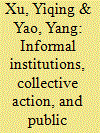

|
|
|
|
|
| Summary/Abstract |
Do informal institutions, rules, and norms created and enforced by social groups promote good local governance in environments of weak democratic or bureaucratic institutions? This question is difficult to answer because of challenges in defining and measuring informal institutions and identifying their causal effects. In the article, we investigate the effect of lineage groups, one of the most important vehicles of informal institutions in rural China, on local public goods expenditure. Using a panel dataset of 220 Chinese villages from 1986 to 2005, we find that village leaders from the two largest family clans in a village increased local public investment considerably. This association is stronger when the clans appeared to be more cohesive. We also find that clans helped local leaders overcome the collective action problem of financing public goods, but there is little evidence suggesting that they held local leaders accountable.
|
|
|
|
|
|
|
|
|
|
|
|
|
|
|
|
| 3 |
ID:
140169


|
|
|
|
|
| Summary/Abstract |
This article offers the first disaggregated, quantitative comparison of Islamist and nationalist violence, using new data from Russia's North Caucasus. We find that violence by Islamist groups is less sensitive to government coercion than violence by nationalist groups. Selective counterinsurgency tactics outperform indiscriminate force in suppressing attacks by nationalists, but not Islamists. We attribute this finding to rebels’ support structure. Because Islamist insurgents rely less on local support than nationalists, they are able to maintain operations even where it is relatively costly for the local population to support them. These findings have potentially significant implications for other contemporary conflicts in which governments face both types of challenges to their authority and existing political order.
|
|
|
|
|
|
|
|
|
|
|
|
|
|
|
|
| 4 |
ID:
140172
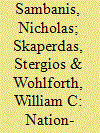

|
|
|
|
|
| Summary/Abstract |
How do the outcomes of international wars affect domestic social change? In turn, how do changing patterns of social identification and domestic conflict affect a nation’s military capability? We propose a “second image reversed” theory of war that links structural variables, power politics, and the individuals that constitute states. Drawing on experimental results in social psychology, we recapture a lost building block of the classical realist theory of statecraft: the connections between the outcomes of international wars, patterns of social identification and domestic conflict, and the nation’s future war-fighting capability. When interstate war can significantly increase a state’s international status, peace is less likely to prevail in equilibrium because, by winning a war and raising the nation’s status, leaders induce individuals to identify nationally, thereby reducing internal conflict by increasing investments in state capacity. In certain settings, it is only through the anticipated social change that victory can generate that leaders can unify their nation, and the higher anticipated payoffs to national unification makes leaders fight international wars that they would otherwise choose not to fight. We use the case of German unification after the Franco-Prussian war to demonstrate the model’s value-added and illustrate the interaction between social identification, nationalism, state-building, and the power politics of interstate war.
|
|
|
|
|
|
|
|
|
|
|
|
|
|
|
|
| 5 |
ID:
140174
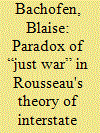

|
|
|
|
|
| Summary/Abstract |
In the Social Contract, Rousseau declares that he has given up the idea of discussing the “external relations” of states. Yet numerous texts—including a recently reconstituted work about the law of war—show that he thought very seriously about the question of the nature and origin of war and of the possibility of making war subject to the rule of law. Rousseau, in contrast to Hobbes, links war's appearance to that of the sovereign states; the state of war is therefore the necessary result of international relations. Moreover, he considers the international law as chimerical. How can he then conceive a non-utopian theory of “just war”? My hypothesis is that his conception of the law of war is deduced from principles of internal political law and arises from pragmatic necessity. The state that discredits itself in its manner of waging war weakens itself while believing that it is reinforcing itself.
|
|
|
|
|
|
|
|
|
|
|
|
|
|
|
|
| 6 |
ID:
140171
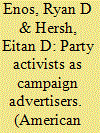

|
|
|
|
|
| Summary/Abstract |
As a key element of their strategy, recent Presidential campaigns have recruited thousands of workers to engage in direct voter contact. We conceive of this strategy as a principal-agent problem. Workers engaged in direct contact are intermediaries between candidates and voters, but they may be ill-suited to convey messages to general-election audiences. By analyzing a survey of workers fielded in partnership with the 2012 Obama campaign, we show that in the context of the campaign widely considered most adept at direct contact, individuals who were interacting with swing voters on the campaign’s behalf were demographically unrepresentative, ideologically extreme, cared about atypical issues, and misunderstood the voters’ priorities. We find little evidence that the campaign was able to use strategies of agent control to mitigate its principal-agent problem. We question whether individuals typically willing to be volunteer surrogates are productive agents for a strategic campaign.
|
|
|
|
|
|
|
|
|
|
|
|
|
|
|
|
| 7 |
ID:
140179
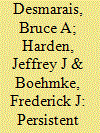

|
|
|
|
|
| Summary/Abstract |
The transmission of ideas, information, and resources forms the core of many issues studied in political science, including collective action, cooperation, and development. While these processes imply dynamic connections among political actors, researchers often cannot observe such interdependence. One example is public policy diffusion, which has long been a focus of multiple subfields. In the American state politics context, diffusion is commonly conceptualized as a dyadic process whereby states adopt policies (in part) because other states have adopted them. This implies a policy diffusion network connecting the states. Using a dataset of 187 policies, we introduce and apply an algorithm that infers this network from persistent diffusion patterns. The results contribute to knowledge on state policy diffusion in several respects. Additionally, in introducing network inference to political science, we provide scholars across the discipline with a general framework for empirically recovering the latent and dynamic interdependence among political actors.
|
|
|
|
|
|
|
|
|
|
|
|
|
|
|
|
| 8 |
ID:
140175
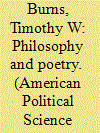

|
|
|
|
|
| Summary/Abstract |
The subordination of poetry to rational guidance has been denounced as a symptom of a specifically Western sickness, with its origin in Plato's Republic. But Plato's disposition to the poets is more complex than is often supposed. Although Book Three's education in civic virtue includes a call for an austere, civic poetry, in Book Ten Socrates finds the wisdom of this provision to need a serious reconsideration, one made necessary because philosophy has emerged as the true answer to the search for a genuinely fulfilling, happy life. Book Ten's reconsideration quietly shows that great poets like Homer are wiser than the earlier examination had suggested, especially about death, and are even indistinguishable from Socratic philosophers in their understanding of and disposition toward death and so in the related matter of the best human life.
|
|
|
|
|
|
|
|
|
|
|
|
|
|
|
|
| 9 |
ID:
140176
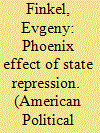

|
|
|
|
|
| Summary/Abstract |
Why are some nascent groups able to organize sustained violent resistance to state repression, whereas others quickly fail? This article links the sustainability of armed resistance to a largely understudied variable—the skills to mount such a resistance. It also argues that the nature of repression experienced by a community creates and shapes these crucial skills. More specifically, the article focuses on a distinction between selective and indiscriminate state repression. Selective repression is more likely to create skilled resisters; indiscriminate repression substantially less so. Thus, large-scale repression that begins at time t has a higher chance of being met with sustained organized resistance at t +1 if among the targeted population there are people who were subject to selective repression at t‒1. The article tests this argument by comparing the trajectories of anti-Nazi Jewish resistance groups in three ghettos during the Holocaust: Minsk, Kraków, and Białystok.
|
|
|
|
|
|
|
|
|
|
|
|
|
|
|
|
| 10 |
ID:
140170
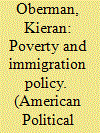

|
|
|
|
|
| Summary/Abstract |
What are the ethical implications of global poverty for immigration policy? This article finds substantial evidence that migration is effective at reducing poverty. There is every indication that the adoption of a fairly open immigration policy by rich countries, coupled with selective use of immigration restrictions in cases of deleterious brain drain, could be of significant assistance to people living in poor countries. Empirically there is nothing wrong with using immigration policy to address poverty. The reason we have to reject such an approach is not empirical but normative. People have human rights to stay in their home country and to migrate elsewhere. Counter poverty measures that require people to move or to stay are likely to violate these rights. Everyone should be free to migrate but no one should be forced to migrate. Using immigration policy to address global poverty, in place of alternatives, fails on both these counts.
|
|
|
|
|
|
|
|
|
|
|
|
|
|
|
|
| 11 |
ID:
140168
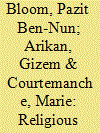

|
|
|
|
|
| Summary/Abstract |
Somewhat paradoxically, numerous scholars in various disciplines have found that religion induces negative attitudes towards immigrants, while others find that it fuels feelings of compassion. We offer a framework that accounts for this discrepancy. Using two priming experiments conducted among American Catholics, Turkish Muslims, and Israeli Jews, we disentangle the role of religious social identity and religious belief, and differentiate among types of immigrants based on their ethnic and religious similarity to, or difference from, members of the host society. We find that religious social identity increases opposition to immigrants who are dissimilar to in-group members in religion or ethnicity, while religious belief engenders welcoming attitudes toward immigrants of the same religion and ethnicity, particularly among the less conservative devout. These results suggest that different elements of the religious experience exert distinct and even contrasting effects on immigration attitudes, manifested in both the citizenry's considerations of beliefs and identity and its sensitivity to cues regarding the religion of the target group.
|
|
|
|
|
|
|
|
|
|
|
|
|
|
|
|
| 12 |
ID:
140177
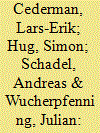

|
|
|
|
|
| Summary/Abstract |
This article evaluates the effect of territorial autonomy on the outbreak of internal conflict by analyzing ethnic groups around the world since WWII. Shedding new light on an ongoing debate, we argue that the critics have overstated the case against autonomy policies. Our evidence indicates that decentralization has a significant conflict-preventing effect where there is no prior conflict history. In postconflict settings, however, granting autonomy can still be helpful in combination with central power sharing arrangements. Yet, on its own, postconflict autonomy concessions may be too little, too late. Accounting for endogeneity, we also instrument for autonomy in postcolonial states by exploiting that French, as opposed to British, colonial rule rarely relied on decentralized governance. This identification strategy suggests that naïve analysis tends to underestimate the pacifying influence of decentralization.
|
|
|
|
|
|
|
|
|
|
|
|
|
|
|
|
|
|
|
|
|